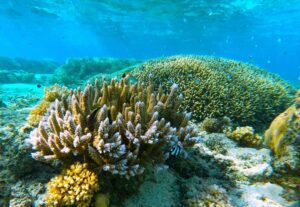 Florida Southern College Assistant Professor of Marine Biology Dr. Jason Macrander has been awarded a research grant by the “Protect Our Reefs” Grants Program through Mote Marine Laboratory and Aquarium. The project titled “Can Coral Venom Expression Predict Propagule Growth,” is a collaborative research grant between Florida Southern College and the University of South Florida.
Florida Southern College Assistant Professor of Marine Biology Dr. Jason Macrander has been awarded a research grant by the “Protect Our Reefs” Grants Program through Mote Marine Laboratory and Aquarium. The project titled “Can Coral Venom Expression Predict Propagule Growth,” is a collaborative research grant between Florida Southern College and the University of South Florida.
Florida Southern College will lead the research project, receiving two-thirds of the grant funds. The project involves opportunities shared between the two schools, specifically benefiting and involving two undergraduate students from each institution. Florida Southern students enrolled in their capstone research for fall and spring semesters in 2022-23 will collect genetic signatures of coral propagules in a high-food and low-food environment to determine the role venom may have on coral propagule health and long-term coral reef recovery efforts.
“The grant includes providing financial compensation for students as they are expected to contribute additional time outside of class to meet the project objectives,” Dr. Macrander said.
FSC student Rose Laconto ’23 will be able to work with corals, but also gain new skills in genetic and bioinformatic analysis to meet the objectives of the proposed research. Laconto, who is from Oxford, Massachusetts, is involved with the Tri-Rho Marine Biology Honors Society.
“I’m super excited to be learning more about coral biology through this project,” Laconto said. “I’m hoping that our findings can really make a difference in restoration efforts!”
Dr. Brad Gemmell at USF will lead their portion. The two met when the biology department invited Gemmell to speak at FSC in 2019. He spoke about adaptations that take place at the microscale to permit organisms to move more efficiently in the water. Dr. Gemmell’s background is in fluid dynamics and animal behavior.
“We have complementary skills to accomplish the goals of the grant, with a shared interest in coral reef restoration and coral biology,” Dr. Macrander said. The collaboration is “essential to establishing connections among other institutions and provide opportunities for students to network and be exposed to new ideas and form collaborative research projects like this one.”
The two educators hope this grant will serve as a seed grant for a larger National Science Foundation (NSF) or National Oceanic and Atmospheric Administration (NOAA) grant in the future.
The grant is funded by the state of Florida through the Mote Marine Laboratory. The Florida Department of Highway Safety and Motor Vehicles sells vehicle specialty license plates for a variety of causes. “Protect Our Reefs” plate purchases help to fund research.
“The Mote grant is for one year; I anticipate our results will be published in a scientific journal summer 2023, with students taking lead author positions,” Dr. Macrander said. “A main focus is student training in this area as there is so much that needs to be done to restore our coral reefs.”



